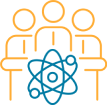Study of HIV-1 Drug Resistance to Dolutegravir - A World Health Organisation Recommended First-Line Therapy
Objectives:
- To study the prevalence and pattern of PDR among HIV infected individuals initiating first-line Highly Active Antiretroviral Therapy (HAART);
- To study the rate of HAART failure and associated Drug Resistance (DR) among individuals failing Dolutegravir (DTG) based first-line HAART;
- To study the prevalence of minority DRMs among HAART naïve and failures
Abstract:
In the past few decades, the introduction of antiretroviral therapy (ART) has significantly reduced HIV-related complications, improving the quality of life for individuals living with HIV. The continuous efforts in HIV research have led to the discovery of numerous new antiretroviral drugs, one of which is Dolutegravir (DTG). Recently, the World Health Organization (WHO) has recommended the use of DTG for HIV treatment due to its efficacy and favorable safety profile. While DTG has shown promising results globally, there is a notable lack of data from India regarding the success rate of DTG-based HIV treatment. Therefore, there is a crucial need to assess the effectiveness of this drug in the Indian population, given the unique genetic diversity and varied patient demographics in the region. Furthermore, limited studies have been conducted to investigate the development of drug resistance among individuals receiving DTG-based Highly Active Antiretroviral Therapy (HAART). Understanding the rate of therapy failure and the patterns of drug resistance mutations that may arise in response to DTG-based treatment is vital for ensuring the long-term success of HIV management. This study aims to fill the knowledge gaps by comprehensively assessing the outcomes of HIV-infected individuals undergoing DTG-based treatment in India. By monitoring treatment responses and analysing genetic changes in the virus over time, researchers can identify potential challenges and vulnerabilities associated with this specific therapeutic approach. The findings of this study will not only inform clinicians about the efficacy of DTG in the Indian context but also contribute to global efforts in refining and optimising HIV treatment regimens.



